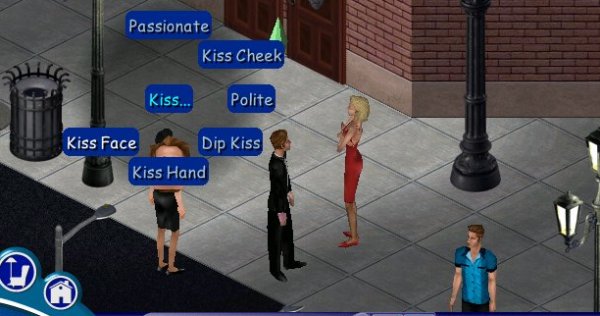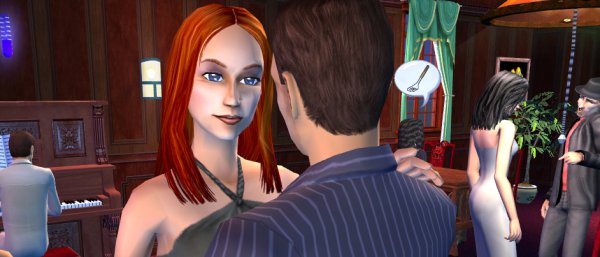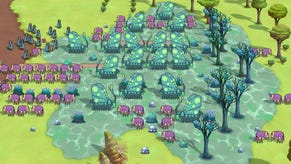ErotiSim: Sex and The Sims
[This is a particularly long piece on The Sims which was written for a project that was canceled at the last minute a couple of years back. Which is a shame, but at least I got paid for it, eh? It's sat around ever since, but since it really is particularly long, it's hard to work out a home. And I'm a little bit precious over it. So rather than cut it to something smaller, I'd rather present it here. Hope you enjoy it.]
It was the phone calls that made me certain. The Sims was going to cross over, one way or another.
I worked in a cramped games magazine office for just shy of five years. There were only three times that we really knew the eye of a media mini-storm was circling somewhere above us. We knew we were being watched at those moments, because every time we answered the phone the same questions came from different missionaries from the Real World Media. The first and biggest spike in calls was part of the fallout of 9/11 when every journalist in the world needed to ask us whether Counter-Strike or Rainbow Six: Rogue Spear or Microsoft Flight Simulator could be used to train terrorists to take over commercial airliners. Majestic, prompting the second and smallest peak, was publisher Electronic Arts’ great failure – a reality-blurring attempt to commercialise the alternate-reality game before anyone really knew what an alternate-reality game was, which bombed in the States and was never released in Europe. The third was sparked by The Sims, Electronic Arts’ great success and one of the most popular and groundbreaking games of recent times.
As much as an article has an origin, it is in one of those calls. It was from a freelancer from help-the-homeless-help-themselves magazine The Big Issue, which wanted to run a feature on The Sims’ runaway success. He was, essentially, looking for a quote saying that it was played by those with no social life to indulge in a surrogate fictional one. He wasn’t interested in the truth – he admitted he’d been provided an angle by his Editor and was working to fulfil it. So I just informed him that, actually, The Sims was actually already receiving a snobbish backlash from actual hardcore gamers, and its fans were in fact non-typical players. Normal people were digging it, not just crazed obsessives. All the while, of course, I was thinking that I should point out that phoning me and asking for that sort of quote was a little like me phoning him and asking him to say that all the homeless are work-shy layabouts who stink of piss.
He’d got it entirely wrong. His wasn’t the answer. But what was? It got my thoughts rolling, and eventually those thoughts coalesced to a single point.
It’s sex.
It’s not the only answer. The Sims is a people simulator, based around creating tiny homunculi and guiding their lives. You get to design and decorate their house, and send them off to work to earn money which you then spend on increasingly luxurious furnishings. It’s this, not the dark urges of the night which actually provides its structure. To use Owain Bennallack’s memorable description, The Sims is an apologia for consumerism. A good life needs friends and company, yes, but a better life can be purchased incrementally at Ikea.
It’s improvisational soapish social fiction, with a full neighbourhood cast interacting under the gamer’s eye and influence. It’s a tool for making dream houses and dream lives – it’s worth nothing that the original working title Will Wright gave The Sims was Doll's House until they noticed it wasn’t particularly popular with typical gaming (i.e. male) focus groups. Unsurprisingly. It’s also a tool for darker, more transgressive fantasies: like all doll’s houses, it’s open to the sort of misuse that older brothers gleeful deploy on younger sisters’ toys. Placing a Sim in a windowless room and refusing to let them out until they starve to death is the modern equivalent of catching a spider beneath a glass in terms of suburban cruelty and torture, with the bonus of a lower arachnid body count.
But while sex is only a relatively small part of The Sims - crucially, your Sim can meet and form relationships with other Sims - it’s the dark heart that underlies everything. It’s not the engine of the game, but the romantic potential is its fuel, driving it onwards. Perhaps appropriately. The Sims simulates life and life’s nothing but a mass of social fabric wrapped tightly around that spark of attraction. And…
Now, I’m aware of Wilde’s "All criticism is autobiography" maxim, and I know that, more than any other game, this is true of The Sims. The world resulting from your actions tends to echo your world-view. You design your Sims, choose what they want and then help them towards it. Being a game about life that places its boundaries admirably wide, players can find whatever world they wish inside it. The classic example of how your desires change the world is how The Sims 2 decides your Sims’ sexuality. Sims are inherently bisexual. It’s only by your actions that their sexuality starts to solidify. Make them act romantically towards the opposite sex and their tastes lean towards straight, and vice versa. Do both, and they'll become bisexual. If you’re someone who only makes heterosexual actions in the game, a heterosexual world will result. The Sims is a mirror.
I’m someone who tends to see the world as a brittle shell over a twitching mass of sexual longings, and my games tend to devolve into love-dodecahedrons as everyone has had a passing moment with everyone else. It could easily be argued that I’m not writing about everyone, but just myself. It’s the equivalent of someone who really liked designing wallpaper textures in The Sims writing a piece about the dark heart of the game being the variable quality of its fittings. It’s not The Sims, it’s me.
That makes perfect sense. Could even be true. I don’t think it is.
You see, there was one similarity about the majority of those phone-calls. After I’d explained the basics, it immediately gravitated towards matters carnal. Can they kiss? Can they have children? Can they have sex? And it’s not just the reporters looking for a story – chat to a non-gamer about The Sims, and the same questions inevitably arise. It’s what they want to know and players are happy enough to tell them. If you listen to people – teenagers especially – talk about The Sims, and if it’s not a tale of toilet-hiding simulated sadism, the conversation inevitably gravitates towards what one Sim did to another. While the amount of time you spend doing any of these acts in the game proper is proportionally tiny – as in real life, unless you’re a sex-worker of some kind – the impact is huge. It is, in some reason, why you do everything else – the point. The pay-off.
That it included these elements is a reason that people have been attracted to The Sims – a life without love, after all, is not much of a life at all. But that there’s an actual power to the in-game incarnation is one reason why it is so enthralling. This is surprising. I’d only realised the actual emotional weight of The Sims when I actually played the original game seriously. That is, sitting down by myself for a few hours, with no distractions. I’d played it in the office, everyone crowded around a PC and shouting orders at whoever was holding the mouse: the simple joy of seeing what this strange toy could do and laughing when a Sim was reduced to tears, or when they wet themselves due to us forgetting to leave time in their busy schedule for bathroom visits. But actually playing with the dolls solo, it was immediately different. I got into it. And as the romances blossomed in the first game, and the slow flirtations with the characters escalated, I was slightly surprised to see that – yes – there was an erotic frisson to it. Not an overwhelming wave of lust, but an awareness that, yeah, I was a bit turned on. Like a hot scene in a film or a book, buttons were being pressed.
It was the last thing I was expecting.
While writing this piece I went for a few drinks with my girlfriend and her annoyingly pretty, annoyingly literary friends. One made the mistake of sticking me with a pointed question on what I was writing for The Book, and had my greasy innards slide forth and bury her alive. She was mildly horrified. She talked about seeing her nine-year-old cousin playing The Sims, before tentatively asking about how lurid its depictions actually get. The subtext is clear: is this something she should be worrying about?
It’s a fair question. And here another aspect of The Sims’ perceptual tricks comes into play. Purely conceptual erotic stimulation – that is, through text in fiction or internet cyber-sex or whatever – is inappropriate for kids. Equally obviously, visual erotic stimulation – from a film sex-scene to your common or garden pornography – is even more obviously inappropriate. Both are overtly sexual. But the little animated world of The Sims, the actual visual feedback, is tame beyond belief. This is why a response – any response at all - immediately bemuses. At its wildest, when two Sims 'makes whoopee', as the game coquettishly puts it, both happily disappear beneath the sheets in a whirl of limbs. It’s hardly the continuing sexual adventures of Brianna Banks.
For that nine-year-old cousin, there is nothing there. There’s literally no more than playing with dolls. Eventually, if they love each other, a baby may come along. It's just a part of playing at grown-up relationships, as you might do with more traditional toys. It's also the reason why there’s no danger, as the real charge of The Sims' erotic element is less in the game, and more in the mind that’s controlling it.
To illustrate this, let’s look at a more extreme group’s use of identical dolls. For pre-pubescents, for all their playful voyeuristic perversity with drawing nipples on Barbie dolls or whatever, they’re just dolls. Compare and contrast to the use that many macrophiles find for the same toys. Macrophiles, as the name may suggest, are people who are turned on by the idea of larger sexual partners. They’re usually males. And the women in question are usually much larger, in an Attack Of The 50ft Foot Woman sort of way.
And the urge is to snigger, but the underlying sadness is that it’s a fetish that can have no real release. These are people with urges that they’ll never be able to express fully. That’s as sad as it gets. So, until mad science goes awry and titanic blondes bestride the Earth, they have to use their imagination. One common method involves Barbie dolls and plastic soldiers, using the juxtaposition between the two characters – tiny soldier and enormous Barbie – as an erotic focus for their masturbatory fantasies.
Same toys, but two very different forms of play depending on whether they’re existing in the mind of a child or a mind of a macrophile.
I give you The Sims.
Some people take this sexual kick further than others. When radical anti-games lawyer Jack Thompson shouted about the user-created game modification that made Sims appear naked in an attempt to get EA (and games) bad press, all it really showed was the limit of his research. There’s much worse out there than just a few bare behinds. While most are happy with the implicit sexual contact in the original game, others want a little more. Or a lot more. Or a world where there are chairs with dildos mounted where Sims can sit and pleasure themselves, or hermaphroditic characters with two sets of genitals, to choose a couple of actual examples. Predictably, this isn’t the normal part of the average gamer's experience, but like a developmental biologist using rare, extreme and pathological mutations to understand what is normal, we can look at the Sims-porn modding subculture and extrapolate backwards.
Hopefully.
On sites like Simulated, Eight Deadly Sims, Pandora’s Sims and Strange Sims we see increasingly bizarre uses of the modding tools. While mainstream sites are for all ages, these have reached such a level of risqué or alternative content that the majority hide behind pay-for-access barriers to ensure that the users at least have a credit card (i.e. aren’t minors), and to earn a little cash. Of all the mod cultures online – and virtually every PC game has users making their own additional content either in publisher-supported or unofficial ways – it’s only The Sims which has such an obvious number of sites which demand money for access. This is particularly unusual: there's a clause in EA's tool licence that they can only be used “on your personal non-commercial website”. That Electronic Arts hasn’t gone after such a sizeable community is interesting in and of itself.
It’s not as if they haven’t had time to notice. I talk to Blade, the curator of Pandora’s Sims, who tells me that the site’s first incarnation – the admirably pun-worthy Sims Exposed – started almost as soon the game first appeared. “I was playing the game one day and I noticed it was a bit boring,” Blade describes. “So I thought… hey! I know what would keep me interested in this! If the Sims were running around naked!”. Taking the standard skins which came with The Sims, with their blurred-out crotches, and transposing in genitalia from his collection of (er) erotic images, he uploaded it to immediate success and controversy. Years later, Pandora's Sims gets just shy of a million hits a month with over 500 paying subscribers.
While Blade mainly plays up his own interest in nude Sims as essentially comedy, laughing himself sick at clothed Sims failing to recognise they're talking to a nudist, the site’s success points to something more. Comedy isn’t one of the things people tend to pay for on the internet. Why do people join the site? He ends up drawing a comparatively sub-cultural conclusion. “A lot of people see The Sims as a new generation of anime porn, and anime has always been popular,” Blade notes, referencing hardcore Japanese animation (More commonly known as Hentai). “Hell, you ask anyone, and I a bet they’ll say they’ve downloaded anime at least once. The Sims is also supposed to simulate real life. What Maxis [the game's developers] didn't realise is peeps want it as real as possible. Like it or not, porn exists in the real world and so does sex and nudity, and peeps want to see this in The Sims whether [Maxis and EA] like it or not.”
It’s the inverse of Jack Thompson’s argument. The radical lawyer posited that since Electronic Arts created the tools which let people add content to the game, they should be responsible for that content – a little like expecting the pencil-maker to be responsible for any resulting sketch. Blade believes he’s using the tools in ways that Maxis had never thought about and wouldn’t approve of. I’m not convinced. The presence of sex, in no matter what limited form, in the original game shows that they were all too aware what people would be interested in, but also knew that by pushing it into the realms of porn they’d never manage to sell in the modern marketplace. Wal-Mart will happily stock SimCity, but not SimFuck. However, while they can’t be responsible for the work people create with their tools, Thompson may be right on one thing – that they knew that people would take the steps they couldn’t for financial reasons. As Blade notes: “Peeps have to buy their game to get our stuff,” he grins. “More $$$ for them.”
So how does The Sims create this ghostly eroticism? There are two main precedents. The first is the one Blade pointed out – hentai, or more generally cartoon porn. Looking purely at the visual elements, it makes sense. The Sims could, with current technology, be rendered in a more realistic fashion, but a more iconic, cartoon approach is utilised. We watch The Sims and we see little animated people making out. It’s certainly true with the porn mods - the implicit becomes overt, what is hinted at now impossible to ignore. You could play The Sims in front of your mother in its unmodified state and not feel ashamed. With the harder edge of Blade’s work attached, unless you have particularly liberal parents, you probably couldn’t.
There are comparisons, sure, but for the game in its natural state, this rings untrue. The actual imagery which you get there is no more explicit than an average Saturday morning cartoon.
There’s something more at play here.
The second precedent is cyber-sex – text-based exchanges between anonymous individuals on the internet, via one of the many communication systems (Instant Messenger, IRC, MUDs). The comparison here is that it’s a form of erotic stimulation only made possible by a machine. When collected into a text document, cyber-sex looks like a badly written sex story – reading one is high comedy. The kick is in the process of its creation, the improvisation, the waiting between words, the place for the mind to run rampant. It’s sex cut to the ideas. We know that sex exists primarily in the mind, but, as Julian Dibbell wrote in his book charting his time living on LamdaMUD, My TinyLife, “It's one thing to grasp the notion intellectually and quite another to feel it coursing through your veins amid the virtual steam.”
This seems closer – it’s clear that The Sims' power comes not from the imagery but the ideas – but it’s still not right. With The Sims, there’s an even sharper comparison, because cyber-sex arose in one of its spin-off incarnations, The Sims Online. Peter Ludlow’s expose of the sordid subculture of online brothels where players would sell cyber-sex for in-game currency – and that the madam was actually a young teenage boy – caused huge controversy, but it was no real surprise to any net veteran. Online games with communication channels always grow their sex subculture. In a game as technically poor as The Sims Online, it’s no surprise that a certain strata of players would turn to sex for their entertainment and in-game profit. Sex sells, especially when there’s nothing better to do.
It’s here we focus on the real difference. As a design, The Sims Online tore the heart out of The Sims in its attempt to capture the massively multiplayer market. The original game is a true single-player experience, in that the vast majority of the entertainment comes from interacting with people who have to be computer-controlled. Befriending an awkward character through your Sims’ skills is a challenge. Befriending a Sim Online is a matter of just chatting to someone via the text interface, and if you hit it off pressing the 'Friend' button. The former is a videogame. The latter is just human social life through an alternative route. Cyber-sex is reliant on there being another person involved, but with the shield of anonymity. The Sims – where it interacts with the brain, becomes interesting and enthrals – is because there is no other person there.
This relies on two of the mystical cores of the videogame. Specifically, immersion and interaction.
Immersion is the end result of the road man started on at the beginning of Kubrick’s 2001: A Space Odyssey. That is, the ability for mankind to extend its consciousness into things which are not it. In other words, a club can become a surrogate claw. A car can become surrogate legs. A computer character can become a surrogate you. When playing Tomb Raider, no-one says says the accurate “that wolf killed Lara Croft”, but rather “that wolf killed me”. Man and machine as one, our consciousness possessing it as modern voodoo.
In the case of The Sims, when we sit and play for a long period of time, we identify increasingly with the characters. We invest. In a long session – and videogame playing sessions are usually longer than a single sitting with any other common cultural form – we’re heavily invested in them. This is why playing with the sexual elements of The Sims in company is comedy and by yourself has that erotic edge. A girlfriend dressed up for a Hallowe'en party in a ludicrously sexy outfit means one thing at a party, but quite another thing privately. Context is all, and in its true solo context we can lose ourselves in The Sims.
Imprinting on our characters over a period of hours engages the adult mind. We know what these simple, iconic forms are actually doing. In other words, we know what they’re doing under the covers and why they may like it and so why we may like it.
Immersion happens when we enter any fictional world, to different degrees. Where it increases in games is that we also have interaction. That is to say, you’re in control… mostly.
A horror game is scariest when you’re unsure of the rules. In the sublime stealth game Thief, shadows conceal you from passing guards. Light areas reveal you. When you’re inexperienced, you don’t understand the exact positions of the boundaries, so you can’t be sure whether a guard will pass by or notice you. The tension is brutal, and the game’s never more enthralling. As your knowledge of what guards will see and hear increases, the game becomes less terrifying. Knowledge is power and the powerful have nothing to fear.
While gaining power brings a different sort of pleasure – that of control – it also generally detracts from emotional impact. It becomes less of an immersive event, and more of a traditional game. In short, videogames are most enthralling emotionally when you’re least in control. As you gain in one area of enjoyment as you lose in another.
It’s true in The Sims. Exposure weakens the Sims – remember the search for a way to make the game “more interesting” as one of the cited reasons for Blade to add more explicit content to the game. When you start, all is unsure. You don’t know the rules, or the real likelihood for success or failure. When I turn to kiss the girl, will she meet my lips or turn away? How far shall I push it? Will the person in the next room hear? What will they do?
And that’s it. The magic of The Sims is that you are both in control and not in control. You can live out your fantasies, imprinting on these fictional characters, deciding what they’ll do next, but you can’t be sure if it’ll all turn out okay. In the moment between ordering a Sim to kiss and seeing the response… that’s where the erotic sparks. It’s not the animation that’s the pay-off – but that you were accepted, the seduction worked, they wanted you after all. And it’s not that you’ve kissed someone, but you know who that person is due to having spent so much time in their simulated company. The Sims is sexy because it creates a complete naturalistic context for it to occur in. It’s about the people, not the actual fucking.
Or so goes the theory. I’m not sure if I believe it myself. I think I do.
You see, the sexual urge is easily tricked. I recall the story about a certain species of rare bright-yellow dragonfly with its numbers dropping like – well – flies. Biologists investigate. They discover that the males have lost all interest in the females, instead preferring to spend all their brief existence attempting to have sex with the enormous bright yellow gas tank just beside the lake. It was theorised that their sexual turn-ons were simply “Long, ovoid and bright yellow”. In rare dragonfly world, that gas-tank was the sexiest thing on Earth. Scientists painted the tank blue and the dragonflies returned to normal.
We laugh at the stupid invertebrates, but we’re just as bad. Take a picture of a naked woman in a magazine. Why does that turn most men on? It’s a two-dimensional image which may not even be in colour. It bears virtually no attribute in common with a real woman but a man’ll happily pay money (or burn bandwidth) to spill his seed over it.
We’re not that clever.
I wasn’t sure I wanted to write this article. It seemed a little strange, even for me, so I felt out the topic with a few of my associates outside of the gaming mainstream. One, an English teacher, hit me with the following anecdote.
She too had a friend. A lovely, if particularly fucked-up friend, involved in a relationship of five years' standing with a lovely (if particularly frustrated) man. A symptom of their problems was that they still had never had sex. She’s not a gamer, but plays The Sims. And on more nights than not, made thinly veiled analogues of her and her partner fall in love and fall into each others arms. Maybe Big Issue Guy had a point - just not the one that his Editor’s prejudices led him to. It’s not gaming geeks with unsatisfied lives. It’s just people. It’s everyone.
I decided to write the article.
















